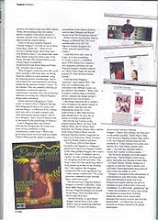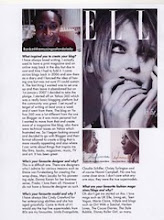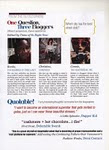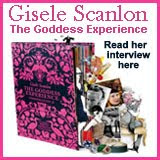Within the fashion industry it would be safe to say that it is the designers who the industry revolves round as it is their designs that are the staple ingredient. A fashion designer's job is to create the concept of their line which represents the ideology of the brand. Meet Ngozi Pere-Okorotie who is the brains between fashion label, Zed-Eye which is a fusion of funky junpsuits, flamboyant shirts and stylish head wraps. Tribal Romance is the theme of Ngozi's collection which is so cool that it caught the eyes of Pride magazine who featured it in their publication. I caught up with London College of Fashion graduate to find out what it is like to be a fashion designer.
How did you get into the fashion industry?
At the age of six I grew the interest of becoming a designer all due to the influence of my mum. My mother ran a fashion academy so I was always surrounded by fashion in that sense. However a distinct trigger was my mum showing me how to use a measuring tape at age six. This aroused my interest enough for me to practice designing outfits for my dolls and the rest as they say is history. I have always wanted to own my own label, though I worked freelance for other fashion brands such as All Saints London and Kew by Jigsaw as an illustrator. It wasn’t easy to go solo, but I learnt from all my mistakes and was burnt on the way by different people who were meant to be helping me grow, but I took it and used the positive side and learnt from it. I must say am grateful for it all as it made me strong and determined to make it. So I decided to start my own brand and that’s how Zed-Eye was born.
What made you decide that fashion design was for you?
Well I have always known it's for me ever since I can remember learning how to talk and have my own imaginative mind as a kid growing up in Nigeria. I have always known that fashion designing was for me; it is what my destiny from God is and I have embodied it by knowing that’s my star.
Tell me what your job consists of.
I am the CEO of Zed-Eye, the clothing brand, I make all the decisions that has to be made regarding the brand. I am very involved and hands on with the manufacturing of the Zed-Eye designs, I research and illustrate my designs, make the samples my self, make my own pattern blocks, and help with the manufacturing of the designs.
How does the fashion scene in Nigeria compare to London?
The fashion scene in Nigeria compared to London is different but not that far apart. The London fashion is in some case more individualised and the freedom of one is not put in a box, while the Nigerian fashion scene is more of a cultural based fashion. Basically we have so much culture to adapt our fashion sense from but speaking for myself I don’t really go with trend, I dress as I feel which is me getting inspiration from both the western world of freedom to be who you want to be and the culture of my mother land Nigeria.
What sort of changes have you seen in the Nigerian fashion industry over the last few years?
I must say I am very proud of the rate at which Nigeria is trying to catch up with the rest of the world when it comes to fashion. On the other hand Nigeria has a lot to learn regarding the fashion industry but one must have hope and pray that the younger generations of designers like myself will help to bring that change and be recognised all over the world for this change, it will be a great and positive thing for the Nigerian fashion industry.
Describe a day in the life of Ngozi Pere-Okorotie.
I try my best to thank God everyday first thing for a great day ahead, then straight to researching and creating as well as producing orders to meet deadlines. Or I might have some fashion styling, or image consultancy, fashion directing to do for magazines or styling for other brands which I do along side running the Zed-Eye design team.
You can check out Ngozi's website here.
You can follow her on Twitter.
Well that is the last installment of Naija Fashionistas, I hope you have enjoyed reading it as I have certainly enjoyed writing it. I would like to thank all the Naija fashionistas who took part in this series.
If you missed out on reading the series then you catch up with it here.
Trend report: What to wear for AW24
5 days ago


























